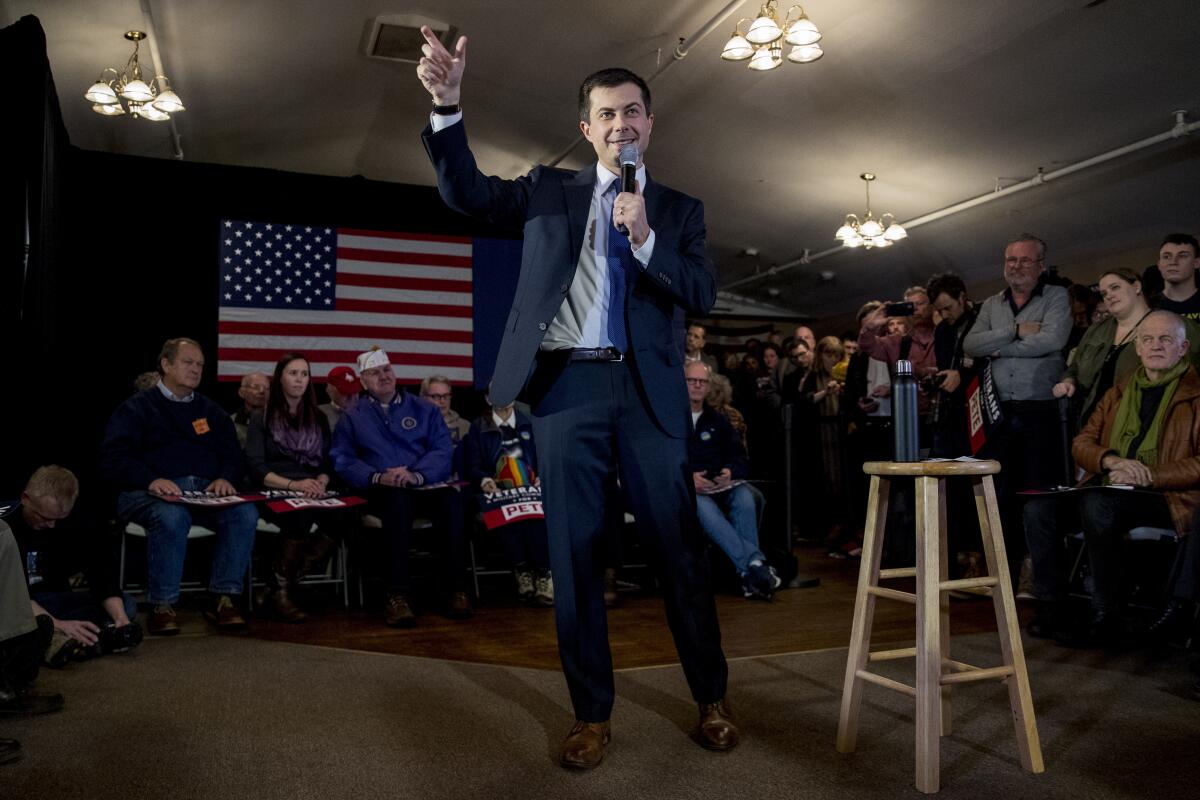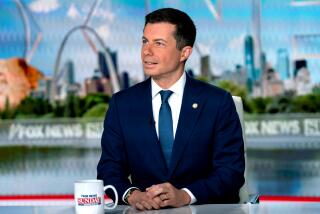Pete Buttigieg surges into New Hampshire, hoping to ride a wave of new support

- Share via
MERRIMACK, N.H. — Ever since September, when Sue Prentiss, the former mayor of Lebanon, N.H., endorsed Pete Buttigieg, she’s been calling unaligned voters to sway them to his side.
This week, her undecided friends started calling her.
“They are ready to commit, want to show support,” Prentiss said of the calls asking for Buttigieg yard signs.
The results out of Monday’s Iowa caucuses remain murky and marred by reporting blunders, but one thing is clear: Buttigieg has rolled into New Hampshire on an upswing few would have predicted when the 38-year-old, openly gay mayor of the midsized town of South Bend, Ind., entered the presidential race a year ago.
After battling Sen. Bernie Sanders to an effective tie in Iowa, Buttigieg now is looking to harness that momentum to carry him to a win in the nation’s first primary. Since Tuesday, when the Iowa results started to come in, he has surged in Granite State polls and raked in cash while rivals, notably former Vice President Joe Biden, look increasingly vulnerable.
But as Buttigieg’s profile has risen, so have the stakes for a win here, in a state that is notorious for scrambling presidential races. A victory Tuesday, or even a strong second place, could solidify Buttigieg’s standing as the leading candidate of the party’s moderate wing; a poor showing could hobble him just as the campaign turns to states with more diverse populations, with whom he has struggled to connect.
“He has to ride this wave without toppling,” said Dante Scala, a political science professor at the University of New Hampshire.
So far, the Buttigieg campaign has much to cheer about.
Multiple polls have shown him in second place in New Hampshire behind Sanders, who lives in neighboring Vermont and won a striking victory here over Hillary Clinton in 2016.
“He’s been jumping dramatically” since the Iowa results, said David Paleologos, the polling director at Suffolk University in Boston, who has polled New Hampshire’s electorate for nearly two decades.
Many of his gains have come at Biden’s expense, Paleologos said, particularly among seniors, a core element in the former vice president’s support.
“Older voters who thought that Biden was the chosen one on the Democratic side, because he was the only candidate to beat Donald Trump ... made the determination over the last two or three days that Biden isn’t invincible,” Paleologos said. “He couldn’t even win in Iowa. He couldn’t even finish in the top three.”
In an interview on “The View” on Thursday, Buttigieg in effect rubbed Biden’s nose in his Iowa drubbing when asked to respond to the former vice president’s claim that it would be risky to elect a president with no more governing experience than being mayor of a small city.
“If that argument is about electability and the ability to win, we just had the first election of the 2020 process, and that’s my answer,” Buttigieg said.
David Hennessey of Pelham, 73, is the sort of senior voter Paleologos was talking about — one who has begun to doubt Biden and lean toward Buttigieg in the aftermath of Iowa.
“It comes down to electability, and Joe is comfortable,” Hennessey said. “I like Pete. I’m just a bit nervous — there are so many idiots out there.”
His fears stem from worry over whether some voters will spurn an openly gay candidate, he acknowledged. But Buttigieg’s solid finish in Iowa “impressed me,” he said, as he waited to see Buttigieg at a veterans’ event in Merrimack. That’s drawn Hennessey out of Biden’s camp for now.
Buttigieg also earned a fresh look from Robin Helrich, who watched the former mayor address a youth climate forum in Concord on Wednesday. Helrich, a retired statistician with the U.S. Department of Agriculture, was drawn to Minnesota Sen. Amy Klobuchar, but worries about her viability.
After Iowa, she is contemplating Buttigieg, she said.
“I like the way he thinks quick on his feet,” said Helrich, who is from Hopkinton. “I’m looking really for somebody who can beat Trump. And it feels like he can stand his own and do that.”
For all the talk of electability and momentum, however, Buttigieg still has not solved one towering problem that has especially dogged his campaign — meager support among black and Latino voters.
“It’s cold in New Hampshire, but he’s going to find the environment a lot warmer here than in Nevada and South Carolina” with their heavily non-white electorates, Scala said.
Buttigieg and his supporters call for patience, arguing that he is still a neophyte on the national political stage. Impressive performances in Iowa and New Hampshire will cause minority voters to take notice, said Rep. Ann McLane Kuster (D-N.H.), one of Buttigieg’s most prominent endorsers here.
“We’ve got to let this play out over the next few weeks,” she said. “The whole country is getting to know him.”
But others say that if Biden, who has maintained a commanding lead among African American voters, falters, there’s no guarantee Buttigieg will reap the benefit.
“There has seemed to be ‘two steps forward, five steps back rhythm’ to his campaign and its engagement in communities of color,” said Laphonza Butler, a Los Angeles-based Democratic strategist.
Butler, who was a senior advisor to California Sen. Kamala Harris’ presidential campaign, noted that Sanders’ campaign emphasized outreach to Iowa precincts with large minority populations, even in a state that is 90% white.
Buttigieg’s Monday night victory speech, by contrast, “referenced rural communities, moderates and ‘soon-to-be former Republicans.’”
“Is he saying that he doesn’t need communities of color to win the Democratic nomination?”
For now, however, the Buttigieg campaign is focusing on the immediate problem of a strong showing in Tuesday’s primary. He and his aides are walking a fine line — talking of momentum while managing expectations in a race that includes two New Englanders, Sanders and Massachusetts Sen. Elizabeth Warren.
“His upside is greater than Bernie’s. If Bernie does not win it, he’s got explaining to do,” Kuster said, noting Sanders’ strong victory four years ago.
With a staff of 75 on the ground and 15 offices across the state, Buttigieg’s campaign is well-positioned to take advantage of the increased interest. As it did in Iowa, the campaign has focused its efforts on independents and even wayward Republicans, a strategy that could be especially fruitful in New Hampshire, where 40% of registered voters are unaligned with a party.
Many of this politically ambidextrous type were on hand at the American Legion hall in Merrimack on Thursday, braving snow, slush and freezing rain to attend a Buttigieg event.
Maura Sullivan, an Iraq War veteran and former Obama administration official, introduced the mayor with references to the Iowa outcome.
“Look at the results,” Sullivan said. “He has proven ... he can unite the country, and he can win.”
Buttigieg, upon taking the stage, called his Iowa finish an “extraordinary validation” of his campaign, before quickly making clear he did not intend to rest on his caucus-night laurels.
“I am also mindful and humbled by the fact that New Hampshire is New Hampshire,” Buttigieg said. “New Hampshire is not the kind of place to let Iowa or anybody else tell them what to do.”
Paul Lacoste, a 62-year-old corporate salesman from Amherst, said Iowa’s decision would have no bearing on his choice.
“A lot of folks in New Hampshire are like that,” he said. “We are independent.”
Lacoste, who voted for Sanders in the 2016 primary and Trump in the general election, said he was intrigued by Buttigieg’s optimistic message.
“He’s going to get a lot of voters just by being positive,” he said.
Prentiss, meanwhile, plans on spending the weekend cajoling more potential voters, including bringing a number of undecided acquaintances to a Buttigieg rally in her hometown.
“I want first place,” she said, harkening back to the days her daughter was a competitive gymnast. “I want that first spot on the podium.”
Mason reported from Manchester and Hook from Merrimack. Times staff writers David Lauter in Merrimack and Mark Z. Barabak in Manchester contributed to this report.
More to Read
Get the L.A. Times Politics newsletter
Deeply reported insights into legislation, politics and policy from Sacramento, Washington and beyond. In your inbox three times per week.
You may occasionally receive promotional content from the Los Angeles Times.












